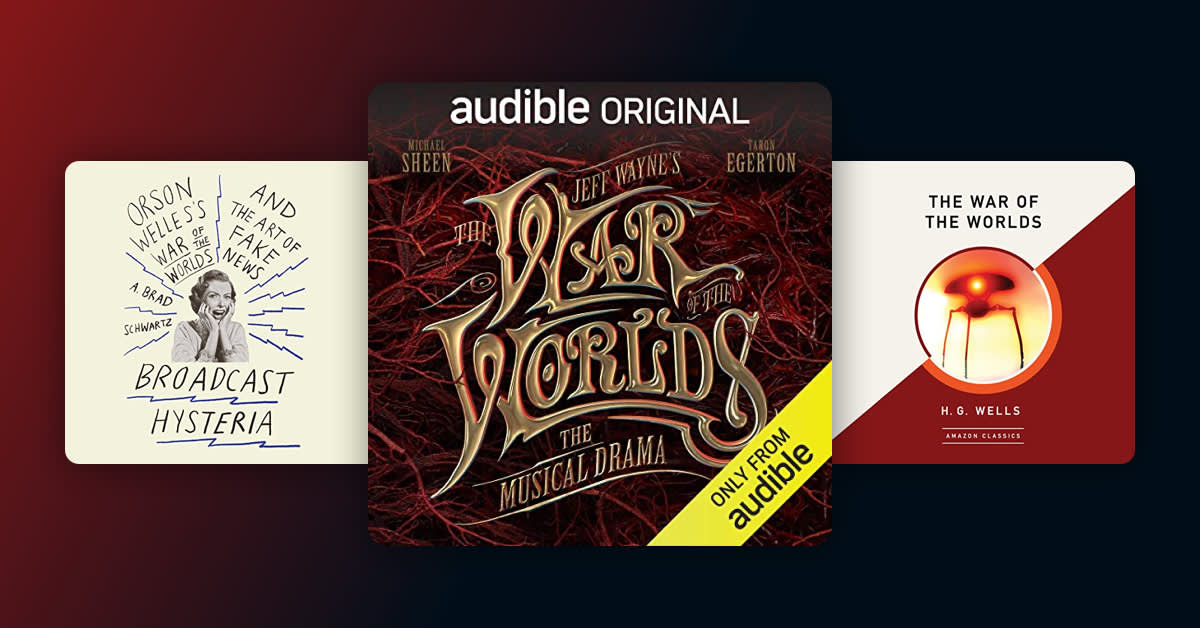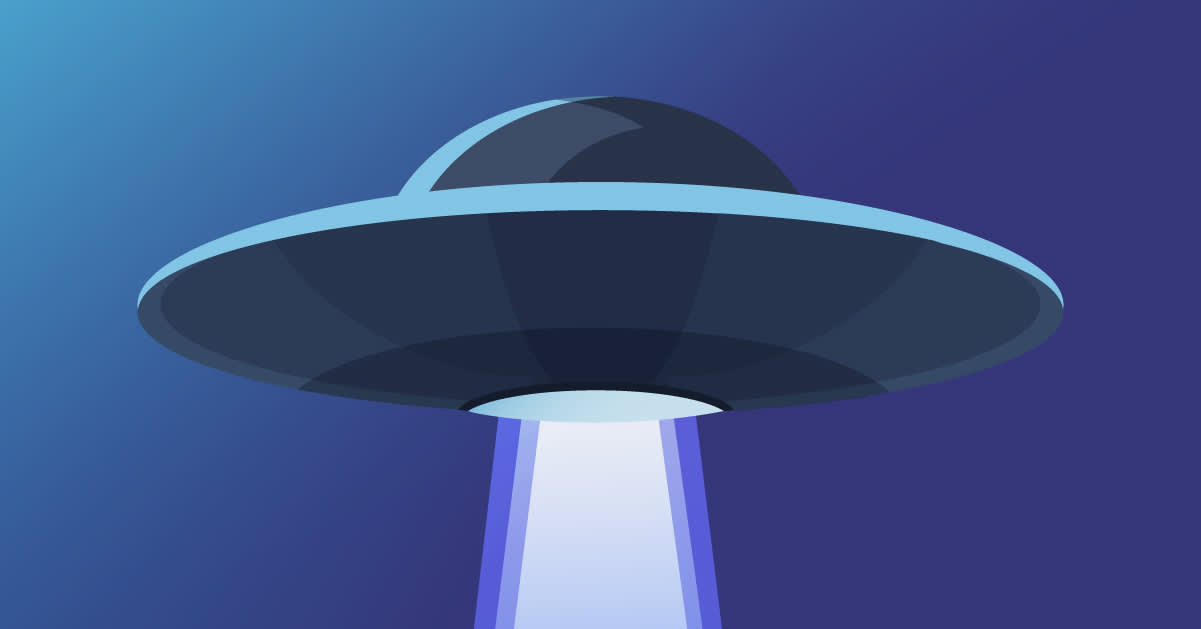On the night before Halloween back in 1938, listeners of CBS radio found themselves hearing what they thought was a live report of an alien invasion of New Jersey. The program described creatures from a spacecraft attacking locals, and the failed efforts of officials and the military to stop them. In reality, the broadcast was an episode of Orson Welles’s radio series The Mercury Theatre on the Air, which had adapted The War of the Worlds by H.G. Wells in the most dramatic fashion imaginable. The story of this radio dramatization and the media’s response to it would make Orson Welles a household name and cement The War of the Worlds—already a successful novel—as a major pillar of science fiction.
H.G. Wells’s The War of the Worlds was first serialized in the UK publication Pearson’s Magazine in 1897. The following year, it was published as a complete volume for the first time, and it has never been out of print in its 125-year history. In the original story, Martians plan and then carry out an invasion of Earth due to a lack of resources on their own planet, in a satirical examination of colonialism (and a reversal of the Earth-to-Mars pipeline we imagine more frequently today). The account is presented from the point of view of a man in England who witnesses and flees the Martian attacks. In The War of the Worlds, Wells is widely credited with establishing a number of science fiction themes and tropes—particularly having to do with extraterrestrial encounters. His work was certainly one of the first to utilize such elements, and so, it became not only a sensation amongst readers but also a large influence on other storytellers. The novel inspired numerous adaptations in various media, including two theatrical films, and, of course, Orson Welles’s infamous radio broadcast.
In 1938, just over 40 years after the novel’s original serialization, Orson Welles’s “The War of the Worlds” hit the airwaves on CBS Radio as a Halloween episode of The Mercury Theatre on the Air. The series consisted of live radio drama adaptations of classic literature, performed each week by the Mercury Theatre repertory company. Other episodes of the program included adaptations of such works as The Count of Monte Cristo, Oliver Twist, and Dracula. And while the series boasted excellent quality overall, “The War of the Worlds” was different.
Determined to produce a show that was fresher and more immersive than any previous radio dramas, Orson Welles brought the idea of a simulated news broadcast to producer John Houseman. Eventually, the H.G. Wells novel was chosen as the source material, with writer Howard Koch to adapt. What followed was a scramble to put together a show that no one was sure would be successful—but, ultimately, resulted in the impactful piece of broadcast radio we recognize today.
“The War of the Worlds” broadcast was presented in two acts, the first of which consisted of the news bulletin and live reporting segments and lasted for nearly 40 minutes straight without any breaks, further strengthening the illusion that the events were occurring in real time. The second act was more akin to traditional radio dramas and followed a survivor, played by Welles himself, in the aftermath of the invasion. While further scrutiny has shown that the degree to which the radio program convinced listeners that the country was truly under attack by Martians could not be considered a case of mass hysteria, it is certainly true that the broadcast was an incredibly effective and engaging means to tell this story. With the realistic format of typical radio programming interrupted by news bulletins, voice performances that expertly exuded shock and horror, and convincing sound effects portraying the otherworldly weapons being used against humans, “The War of the Worlds” is an undeniable testament to the power of audio. As A. Brad Schwartz discusses in his book Broadcast Hysteria, a history and analysis of the phenomenon this radio broadcast became, "The War of the Worlds" powerfully fed on the widespread anxiety over a real impending war and used Americans’ captivation with recent changes in broadcast radio to its advantage.
It is true, at least anecdotally, that some listeners who tuned in to the 1938 broadcast were genuinely convinced that an extraterrestrial crisis was unfolding. But the real outcry came in the following days as media reporting deemed the broadcast deceptive. Newspapers gave the impression that there had been widespread panic across the country and decried radio for creating an environment in which this could occur. Welles made a public apology and no further actions were taken, but the publicity sealed his reputation among the general population and within the entertainment industry as both a bold innovator and a trickster. He would eventually go on to become a successful filmmaker, largely considered one of the most influential in history.
While H.G. Wells’s The War of the Worlds had huge impacts on the science fiction genre in regards to literature, Orson Welles’s “The War of the Worlds” made incredible waves in and of itself, even spawning adaptations of its own. Howard Koch, the writer who adapted the novel for The Mercury Theatre on the Air, wrote a play based on the panic, which was then adapted into a television movie, The Night That Panicked America. The Mercury Theatre on the Air was inducted into the Radio Hall of Fame, and the original “The War of the Worlds” recording was added to the Library of Congress’s National Recording Registry. And now, 85 years out from that fateful broadcast, we can only look back, remember, and celebrate that triumph of audio storytelling—one that wielded the medium with fearless finesse. Here are just a few listens that mark this major anniversary of a standout story momentously told.
What better way to celebrate “The War of the Worlds” broadcast’s 85th anniversary than to immerse yourself in the original recording? Hear for yourself the writing, performances, and effects that fooled some listeners and triggered a media frenzy over both the credibility of radio and the true intentions of creator Orson Welles. Even listening today, close to a century later, the quality of this broadcast as a supremely effective piece of audio media is indisputable.
Once you've listened to the radio broadcast adaptation, switch gears and take a listen to H.G. Wells’s original novel. Get a better sense of the author’s brilliance, not only in terms of his ingenuity with scientific subjects and the resulting impact on science fiction but also in terms of his sharp commentary on imperialism and various issues and fears common in the Victorian era. This particular edition is performed by renowned narrator Simon Vance, and his voice lends immense gravity and solemnity to the story.
For further background and insight into the greater phenomenon of Orson Welles's infamous radio broadcast, Broadcast Hysteria provides an incredibly in-depth examination into the events leading up to, during, and following the episode's arrival on the airwaves. A. Brad Schwartz conducted original research, looking through hundreds of letters sent to Welles and the FCC following the broadcast, and analyzing the role of “The War of the Worlds” in the American media landscape.
Rediscover The War of the Worlds anew with the Amazon Classics edition of the novel. Performed by classically trained actor and Audie Award winner Matthew Lloyd Davies, it is a wonderful pick for those who already know the story and are looking to come back to it with fresh ears—or for those who are totally unfamiliar with the original source material behind the broadcast sensation and seeking an introduction.
Among the many adaptations of The War of the Worlds is the 1978 musical album by musician and producer Jeff Wayne. This Audible Original is a new production of Wayne’s bestselling album, including additional new music and story. The all-star cast includes Michael Sheen, Taron Egerton, Theo James, and Anna-Marie Wayne. Experience yet another version of this story and the extra magic that can be brought to it through innovative audio.









